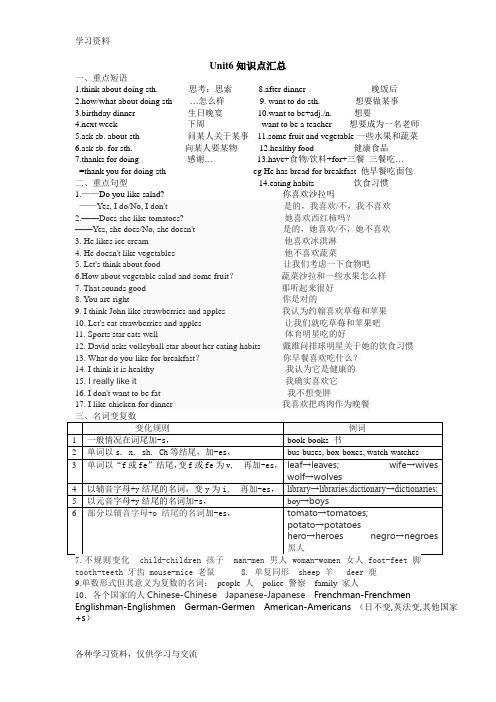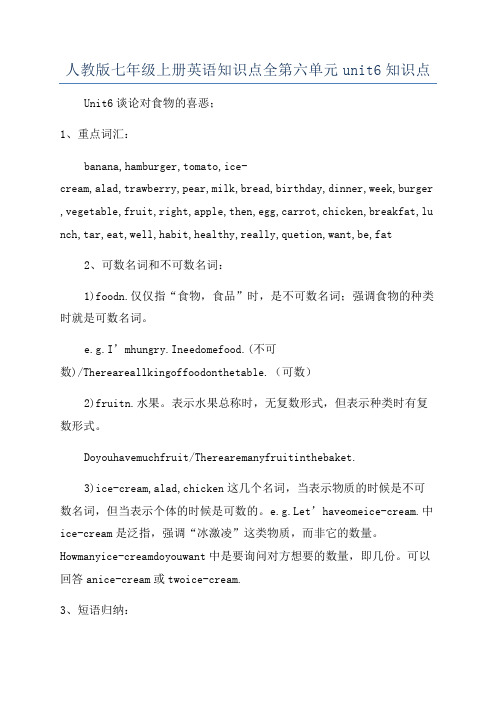七年级上册英语Unit 6知识讲解
- 格式:pptx
- 大小:38.15 KB
- 文档页数:3


Unit 6 Let’s go!词汇精讲1.ride v.骑;乘坐【用法详解】ride在此处作动词,常见用法如下:ride a/the/one's bike(to...)骑自行车(去……)ride horses/a horse 骑马ride to+地点名词骑车去某地Mary rides her bike to school every day.玛丽每天骑自行车去上学。
My father likes riding horses.我爸爸喜欢骑马。
We can ride to the park.It's near here.我们可以骑车去公园。
它离这儿不远。
【拓展延伸】ride还可作名词,意为”(乘车或骑车的)短途旅程;供乘骑的游乐设施”。
Steve gave me a ride on his motorbike.史蒂夫用摩托车捎了我一程。
The rides are free.免费乘坐。
2.take a/the bus 乘坐公共汽车【用法详解】take a/the bus意为"乘坐公共汽车"。
take作动词,在此处意为"乘坐(某种交通工具)",其后接车、船或飞机等交通工具,即:take a/the bus/train/taxi/plane 等。
You can take a bus to the zoo.你可以坐公共汽车去动物园。
Shall we take a taxi to the hospital? 我们坐出租车去医院,好吗?【拓展延伸】take作动词的其他用法:(1)意为”拿;取”。
Take the books to the classroom,please.请把这些书拿到教室里。
(2)意为"选中;买下”。
I like the T-shirt.I'll take it.我喜欢这件T恤衫。
我要把它买了。
3.get off 下车;从……下来She gets off the bus and turns left. 她下了公共汽车,然后往左拐了。

一轮复习:七上U6 词汇+语法讲解【单词默写】【单词变性】healthy形容词变名词______________ really副词变形容词______________ well副词变形容词______________ week名词变形容词______________1. well ______________ _____________________ ___________________ ________________Well, let’s talk about it next time.Mary does well in English.I don't feel very well today.You can get water in the well.2. right ______________ _____________________ ___________________ ________________ ______________ Everyone has his own rights in the society.Yes, that’s right.All right, let’s go to the cinema.I’m sorry. That’s all right.I sit on the right of Mary while Mary sits on the left of me.3. then __________ ___________Till then, everything is too late.First, you put the meat into the pot. Then, mix it with water.4. question ________________ ________________I have many questions to ask my teacher.I was questioned by a policeman about the murder last night.5. want ________________ ________________I want to stay at home because of the rain.You are wanted to be a volunteer.The thief was wanted on the web.Do you want something to drink?【词汇用法】1. sure: adv./adj./be sure to do sth./be sure that…/make sure that…/make sure to do sth.2. so: adv./conj./so adj./adv. that/so that/so as to/not as adj./adv. so/I think so/I hope so.相关词辨析: because vs. sobecause: conj./因为/不与so连用so: conj./所以/不与because 连用3. habit: n./develop a habit of/break a habit of/good habits/bad habits近义词辨析: habit vs. custom vs. culturehabit: n./习惯custom: n./习俗culture: n./文化4. be: v./be+Adj./be+done/be+n./be+to do/be +doing/be +PP(prep. Phrase)5. eat: vt./eat sth./eat up近义词辨析: have vs. eathave: vt./have lunch(享用一餐)eat: vt./eat rice(享用具体的东西)【攻占语法】动词(二) 实义动词一、动词的分类: ____________ _____________ _____________ ______________二、动词的位置: 在句中充当_____________, 放在___________ 的前面或_____________的后面三、动词的用法:2. 实义动词1) 感官动词look/sound/taste/smell/feel +adj.2) 感观动词watch/see/hear/observe sb. do/doing sth.3) 使役动词make/let/have sb. do sth.get sb. to do sth.make sb./sth. donehave sth. donehave sth. doingget sb./sth. done4) 及物动词动词+名词5) 不及物动词动词单独使用动词+介词+名词请在及物动词的框内打”√”,不及物动词的框内打”×”□ask□buy □call□come □eat□excuse □find □finish □get□go□have□know□let□like□look□lose□meet□need□play□say□see□sell□sound□spell□take□thank□think□want□watch□help□love6) 双宾语动词动词+间接宾语+直接宾语动词+直接宾语+to/for +间接宾语请在是双宾语动词的框内打”√”□teach □learn □buy□sell□order □lend □borrow □dress□bring□take□send□give□tell□pay□hand□show□offer□read□pass□help□want【词汇练习】1.Amy usually eats an a ________ after lunch because it's her favorite fruit.2.Let’s think about some food for Henry’s b ________ party.3.For b ________ I have a glass of milk and some bread. They are healthy.4.Potatoes, c ________, and cabbages are vegetables my son likes best.5.We always have rice, chicken and salad for d________.6.I want to know something about David, the volleyball star's e________ habit.7.I have e________ for breakfast every day.8.Judy likes eating sweet food and doesn’t like doing sports. As a result, she becomes f ________ and unhealthier.9.Eggs, milk and strawberries are all healthy f________.10.I eat f ________ and vegetables every day, which are good for my health.11. A good study h ________ will help you learn English well.12.Tom ate a big breakfast. He had a h ________, an egg and milk.13.Do you want to be h _______? Then you need to eat well and do sports every day.14.All the students have l________ at school from Monday to Friday.15.I can’t answer this q ________. It’s too difficult.16.I like English very much. It's r________ easy.17.I need some vegetables, fruits and yogurt to make fruit s ________.18.He doesn’t want to be late for school again, s ________ he eats quickly and runs to school.19.For fruit, Jack likes apples and s________.20.—Can you come to my party?—That’s for s _______.21.I want a bowl of t ________ noodles, because I like vegetables very much.22.Eat more v ________ and less meat, then you will be healthier.23.We have five English classes a w________.24.It is w________ known that Hangzhou is a perfect city for sightseeing.25.Please come to our club, you are w ________ to join us!【参考答案】healthy形容词变名词health really副词变形容词real well副词变形容词good week名词变形容词weekly1. well 好吧擅长感觉舒服井Well, let’s talk about it next time.Mary does well in English.I don't feel very well today.You can get water in the well.2. right 权力对的好吧没关系右边Everyone has his own rights in the society.Yes, that’s right.All right, let’s go to the cinema.I’m sorry. That’s all right.I sit on the right of Mary while Mary sits on the left of me.3. then 那时然后Till then, everything is too late.First, you put the meat into the pot. Then, mix it with water.4. question 问题询问I have many questions to ask my teacher.I was questioned by a policeman about the murder last night.5. want 想应聘通缉想要I want to stay at home because of the rain.You are wanted to be a volunteer.The thief was wanted on the web.Do you want something to drink?一、动词的分类: be 动词情态动词助动词实义动词二、动词的位置: 在句中充当谓语,放在主语的前面或宾语的后面三、动词的用法:请在及物动词的框内打”√”,不及物动词的框内打”×”√ask√buy √call×come √eat√excuse √find √finish √get×go√have√know√let√like×look√lose√meet√need√play√say√see√sell×sound√spell√take√thank×think√want√watch√help√love6) 双宾语动词动词+间接宾语+直接宾语动词+直接宾语+to/for +间接宾语请在是双宾语动词的框内打”√”√teach □learn √buy √sell √order √lend□borrow□dress√bring□take√send√give√tell√pay√hand√show √offer √read√pass□help□want【词汇练习】apple birthday breakfast carrots dinner eating eggs fatter food fruits habit hamburger healthy lessons question really salad so strawberries sure tomato vegetables week well。

人教版七年级上册英语知识点全第六单元unit6知识点Unit6谈论对食物的喜恶;1、重点词汇:banana,hamburger,tomato,ice-cream,alad,trawberry,pear,milk,bread,birthday,dinner,week,burger ,vegetable,fruit,right,apple,then,egg,carrot,chicken,breakfat,lu nch,tar,eat,well,habit,healthy,really,quetion,want,be,fat2、可数名词和不可数名词:1)foodn.仅仅指“食物,食品”时,是不可数名词;强调食物的种类时就是可数名词。
e.g.I’mhungry.Ineedomefood.(不可数)/Thereareallkingoffoodonthetable.(可数)2)fruitn.水果。
表示水果总称时,无复数形式,但表示种类时有复数形式。
Doyouhavemuchfruit/Therearemanyfruitinthebaket.3)ice-cream,alad,chicken这几个名词,当表示物质的时候是不可数名词,但当表示个体的时候是可数的。
e.g.Let’haveomeice-cream.中ice-cream是泛指,强调“冰激凌”这类物质,而非它的数量。
Howmanyice-creamdoyouwant中是要询问对方想要的数量,即几份。
可以回答anice-cream或twoice-cream.3、短语归纳:John’birthdaydinner约翰的生日晚餐ne某tweek下周thinkabout思考,考虑howabout怎么样omefruit一些水果hibirthday他的生日porttar体育明星eatinghabit饮食习惯forbreakfat作为早餐fordinner作为晚餐onelatquetion最后一个问题healthyfood健康的食品3、tomato可数n.“西红柿”复数形式:tomatoe人教版七上2022知识点总结全类似的以o结尾的名词,需加–e构成复数形式的单词还有potato,hero但photo等词而是以加—构成复数形式的。

Unit 6 The power of plants一、单词解析1.Within (介词) 在(建筑物或地区);在(某段时间/距离)之内Eg: within a plant 在植物工厂内部Within seven days 七天之内2.Quarter (名词) 一刻钟;十五分钟;四分之一常见搭配:a quarter of ... 四分之一的...Three quarters of ... 三分之一的...Eg: At lease a quarter of his spare money goes on books. 他的余款至少四分之一花在书上。
3.Past (介词) 晚于;在...之后;超过(形容词) 过去的;从前的(名词) 过去;昔日常见搭配:ten past nine 九点十分In the past 在过去Eg: He ran past me and went out of the door. 他从我身边跑过,夺门而出。
There were lots of tree here in the past. 过去这里有许多树。
4.No. (number的缩写) 第...号Eg: the No. 6 bus 六路公共汽车5.Collect (动词) 收集;采集;使集中派生词:collector (名词) 收藏家-- collection (名词) 收藏品常见搭配:collect stamps 集邮Eg: She likes collecting stamps very much. 她非常喜欢集邮。
6.Send (动词) 送出;发出知识拓展:send sb. sth. = send sth. to sb. 给某人寄某物Send sb. to + 地点名词把某人送到某地常见搭配:send out 发出(光亮等)Send up 发射;送上来Send off 派遣;给...送行Eg: Would you send up two bottles of milk to Room 303, please?请送两瓶牛奶到303房间好吗?7.Rise (动词) 升高;上升常见搭配:rise up to ... 上升到...知识拓展:rise, arise与raise区别:Rise (动词)“上升”表示由低到高的变化过程,强调主语自身移向较高位置。

基础义务教育资料Unit6Do you like bananas?.知识点梳理Section A课文要点全解Tomatoes西红柿1.Tomato可数名词,意为“西红柿",tomatoes是tomato的复数形式。
There are three tomatoes on the table.桌子上有三个西红柿。
助记:以o结尾需加-es构成复数形式的名词英雄(hero)爱吃西红柿(tomato)和土豆(potato),真有意思(es)。
典例精讲-How many are there?-About fifty.A.tomatosB.tomatoesC.tomato解析:我们可采用“语法分析法”解答本题。
句意:”有多少个西红柿?”“大约五十个。
”how many后接复数名词, tomato是以o结尾且表示有生命的事物的名词,变复数时在词尾加・es。
答案:Bo2.Salad沙拉Salad名词,意为“沙拉”,它是音译而来的。
Salad是西餐中一道经典的凉拌菜。
传统的沙拉是将洗净、切成块状或片状的生蔬菜(通常包括主菜、黄瓜和西红柿等)与沙拉酱混合,均匀搅拌即可。
沙拉也有水果沙拉(fruit salad)、土豆沙拉(potato salad)>海鲜沙拉(seafood salad)等多个品种。
Do you like fruit salad?你喜欢水果沙拉吗?I like potato salad.我喜欢土豆沙拉。
[拓展]谐音记忆各种“外来食品”:[英]hamburger-#译--[汉]汉堡包[英]salad--音译--[汉]沙拉[英]sandwich-音译-[汉]三明治k牛奶Milk不可数名词,意为“牛奶”。
My father doesn't like milk,我父亲不喜欢牛奶。
[拓展]milk作动词,意为“挤(牛、养等的)奶”。
He is milking a cow.他正在挤牛奶。
典例精讲There is some in the fridge.It's fresh.kB.applesC.egg解析:我们可以采用“综合分析法”解答本题。
Unit 6 Do you like bananas?1.salad n. 沙拉当salad 为不可数名词时,通常指整体的食物概念,例如:He likes eating salad.“一盘沙拉”时,是可数名词,复数形式为salads。
当salad的含义为“一份色拉”、k n.牛奶a glass of milk 一杯牛奶two glasses of milk 两杯牛奶3.bread n.面包a piece of bread 一片面包4.birthday n. 生日Happy birthday to you! 祝你生日快乐!5.dinner n.正餐have dinner 吃晚餐birthday dinner 生日晚宴6.week n. 周;星期(adj./adv.)weekly 每周的next week 下周7.★think about 思考;思索(强调思考的过程)★think of 认为;想起(强调思考的结果)Eg:Let’s think about the food.I like this song,but I can’t think of its name.8.food n. 食物指“食物,食品”时,是不可数名词;强调食物的种类时,是可数名词。
9.right adj. 正确的;—(反义词)wrong 错误的adj. 右边的;—(反义词)left 左边的★All right!用作对方建议或劝告的应答语。
Eg:—Let’s go and ask him.让我们去问他。
—All right. 好的。
10.star n. 星星;明星a volleyball star 一个排球明星11.eat v. 吃★eating habits 饮食习惯12.well adv. 好;令人满意地(adj.)good 好的Eg:Sports Star Eats Well.I have good eating habits.13.question n. 问题one last qusetion 最后一个问题14.healthy adj. 健康的(n.)health 健康★keep healthy 保持健康15.want v. 想要want sth. 想要某物want to do sth. 想要做某事want sb. to do sth. 想要某人做某事Eg:I don’t want to be fat.16.—What do you like for breakfast?—I like ........【语法】名词的单复数有些名词既可作可数名词又可作不可数名词,但意义不同,要注意区分.①glass cn.杯子un.玻璃orange cn橘子un.橘汁①还有表示动物类的名词,表示动物时是可数名词,表示为菜肴时是不可数名词. chicken cn.小鸡un.鸡肉fish cn鱼un鱼肉①salad, icecream, food, fruit 作总称讲是不可数名词,作种类讲是可数名词【即学即练】一、请写出下列词的复数形式city _____ _zoo ______country _____ tooth ____mouse _________ boy____________ broom ___________car ____tree ______horse ______ bus______________ fox _____branch ____ baby _____ family _____ dish _____radio _____ photo _____ piano _____ knife _____leaf _____ life _____ thief _____ _man _____woman _____ child ___ foot______this _____________ watch___________ diary____________ day____________ book____________dress____________ sheep___________ tea_____________ box___________ strawberry_________ peach__________ sandwich__________ paper_________ juice__________ water____________ milk___________ rice__________people ______CD________ ox___________deer____________ fish___________二、选择填空.( )1. They e from different ______A. countryB. countriesC. a countryD. countrys( )2. How many ______ do you see in the picture?A. tomatosB. tomatoesC. tomatoD. the tomato( )3. They are______.A . woman teachers B. women teachersC. women teacherD. woman teacher( )4. Would you like _______ ,please?A. two glass of waterB. two glasses of waterC. two glass of watersD. two glasses of waters( )5. Most of ______ live in _______.A. Germans, GermanB. German, GermenC. Germen, GermanyD. Germans, Germany( )6. There are some ______ in these _______.A. knifes pencilboxesB. knives pencilsboxC. knives pencilboxD. knives pencilsboxes( )7. ______ like ______ by air.A. Greens, travellingB. The Green, travelingC. The Greens, travelD. The Greens, traveling( )8. I wonder why ______ are interested in action films(武打片).A. the peopleB. peopleC. peoplesD. the peoples( )9. There is no ______ in the plate.A. applesB. orangesC. riceD. eggs( )10.My uncle has three _______.A.childB.childsC.childrenD.childrens四.填入所给名词的正确形式。
7A Unit 6 知识点第一课时Welcome to the unit1. An apple a day keeps the doctor away.① keep vi.&vt. (使)保持, (使)处于keep sb. /sth. doing sth. 让.....一直做.... Eg. keep the dog runningkeep sb. /sth. + adj. Eg. keep us warmkeep sb. /sth. + adv. Eg. keep him away/out② a day每天Eg. The apples are 5 yuan a kilo.2. How healthy are you? .It is good for our health.① health n. 健康(in) poor/ good health健康状况糟糕/很好healthy adj. 健康的a healthy lifestyle 健康的生活方式②注意辨析healthy健康的(指较长时间稳定的健康状况)keep / feel healthy 保持/感觉健康well健康的(尤用于描述或询问健康状况)fine很好(用于在别人问你身体如何时作答, 或谈论别人的健康状况时; fine 只用于回答,不用于提问或陈述)Eg.—How are you? —Fine, thanks.③ be good for sth. / sb. 对......有益Eg. Eating healthy food is good for you.be good to sb. 对......友善Eg. He is always good to others. 他一直对别人很友善。
★ Sth. is + adj. to sth.Sth. is + adj. for sb. to do. = It is + adj. for sb. to do sth.Eg. Healthy food is important to us. 健康的食物对我们很重要。
人教版七年级上册英语Unit 6 Do you like bananas? 知识点总结1. A: Do you like tomatoes? 你喜欢西红柿吗?B: Yes, I do./No, I don't. I don't like tomatoes 是的,我喜欢。
不,我不喜欢。
我不喜欢西红柿。
2.-Does your father like carrots? 你的爸爸喜欢胡萝卜吗?- Yes, he does./ No, he doesn't. He doesn’t like carrots. 是的,他喜欢。
/不,他不喜欢。
他不喜欢胡萝卜。
3. sb’s birthday dinner 某人的生日晚宴4. next week 下周5. think about 考虑6. some fruit/food 一些水果 /食物7. Let’s have ice-cream. 让我们吃冰激凌吧。
8. eat well 吃得好9. ask…about …向某人询问某物10. eating habits 饮食习惯11. What fruit do you like? 你喜欢什么水果?12. for breakfast/lunch/dinner 就早 /午/晚餐而言13. It’s healthy. 它是健康的。
14. I really like it. 我真的喜欢它。
15. I like chicken for dinner. 晚餐我喜欢吃鸡肉。
16. one last question 最后一个问题17. after dinner 晚饭后18. I don’t want to be fat. 我不想变胖。
1、Do you like hamburgers? 你喜欢汉堡包吗?Yes, I do. No, I don’t是的,我喜欢。
/ 不,我不喜欢。
2、I like French fries. 我喜欢在薯条。
七年级上册英语unit6知识点归纳七年级上册英语Unit 6知识点归纳Unit 6的主题是“Where's my backpack?”,讲述了人物小明和小红在学校不小心把背包丢了,接着在学校寻找背包的过程中,学习到了一些有关位置的词汇和表达。
在这个单元中,我们学习了以下知识点:一、地点和位置的表达1. 在房间内例如:My bag is under the chair.(我的书包在椅子下面。
)The book is on the desk.(那本书在桌子上。
)2. 在建筑物内例如:The library is next to the gym.(图书馆在体育馆旁边。
)The restroom is opposite the classroom.(厕所在教室对面。
)3. 在城市内例如:The park is in the center of the city.(那个公园在城市中心。
)The mall is on Main Street.(商场在主街上。
)4. 其他位置例如:I'm in the front of the classroom.(我在教室前面。
)She is behind the tree.(她在树后面。
)二、问路和指路1. 问路例如:Excuse me, where is the restroom?(对不起,请问厕所在哪里?)Can you tell me how to get to the school library?(你可以告诉我怎样去学校图书馆吗?)2. 指路例如:Turn left at the corner.(在拐角处左转。
)Go straight ahead.(一直往前走。
)三、方位词1. 介词例如:The bank is across from the park.(银行在公园对面。
)The supermarket is between the post office and the bookstore.(超市在邮局和书店之间。